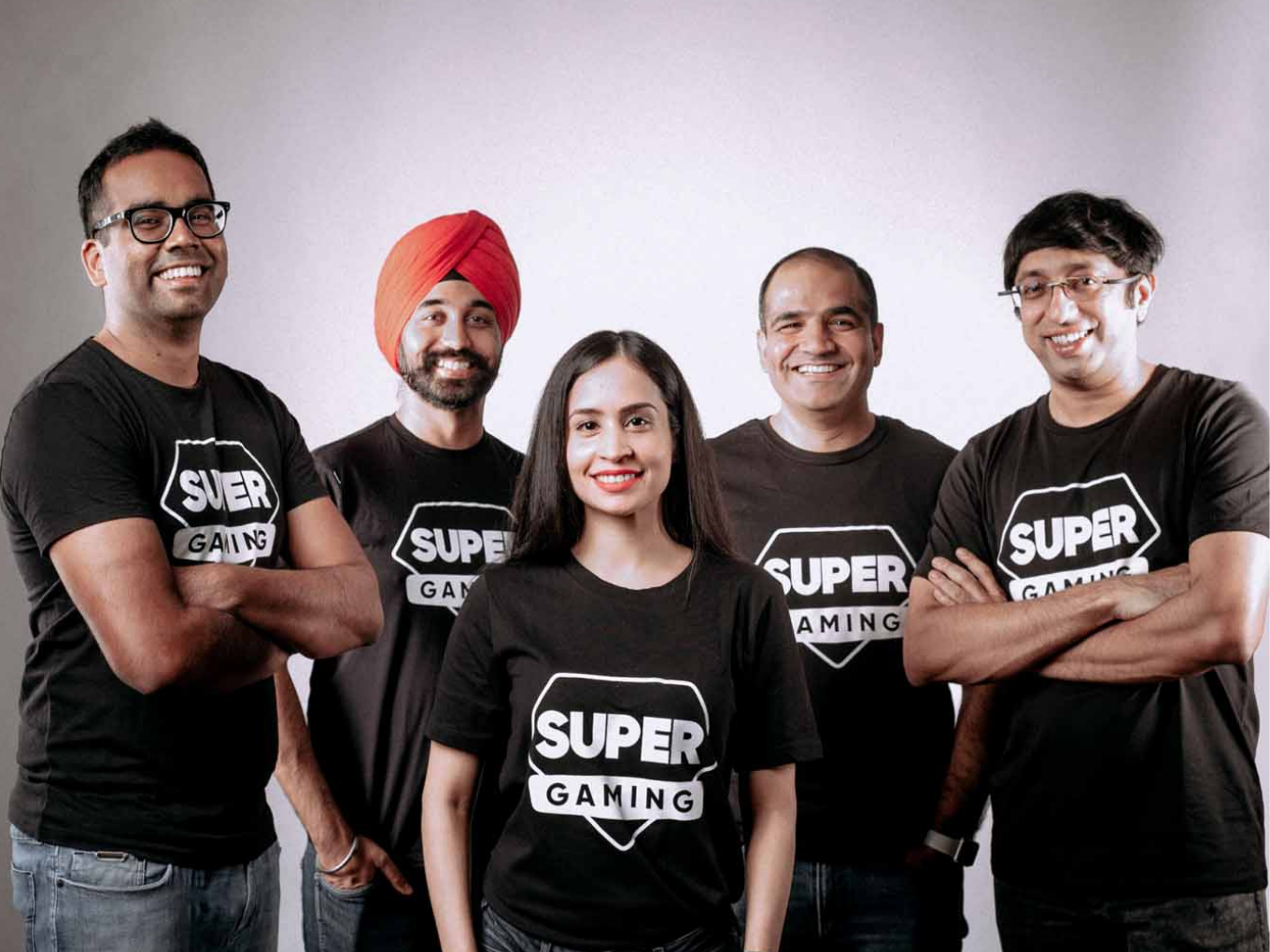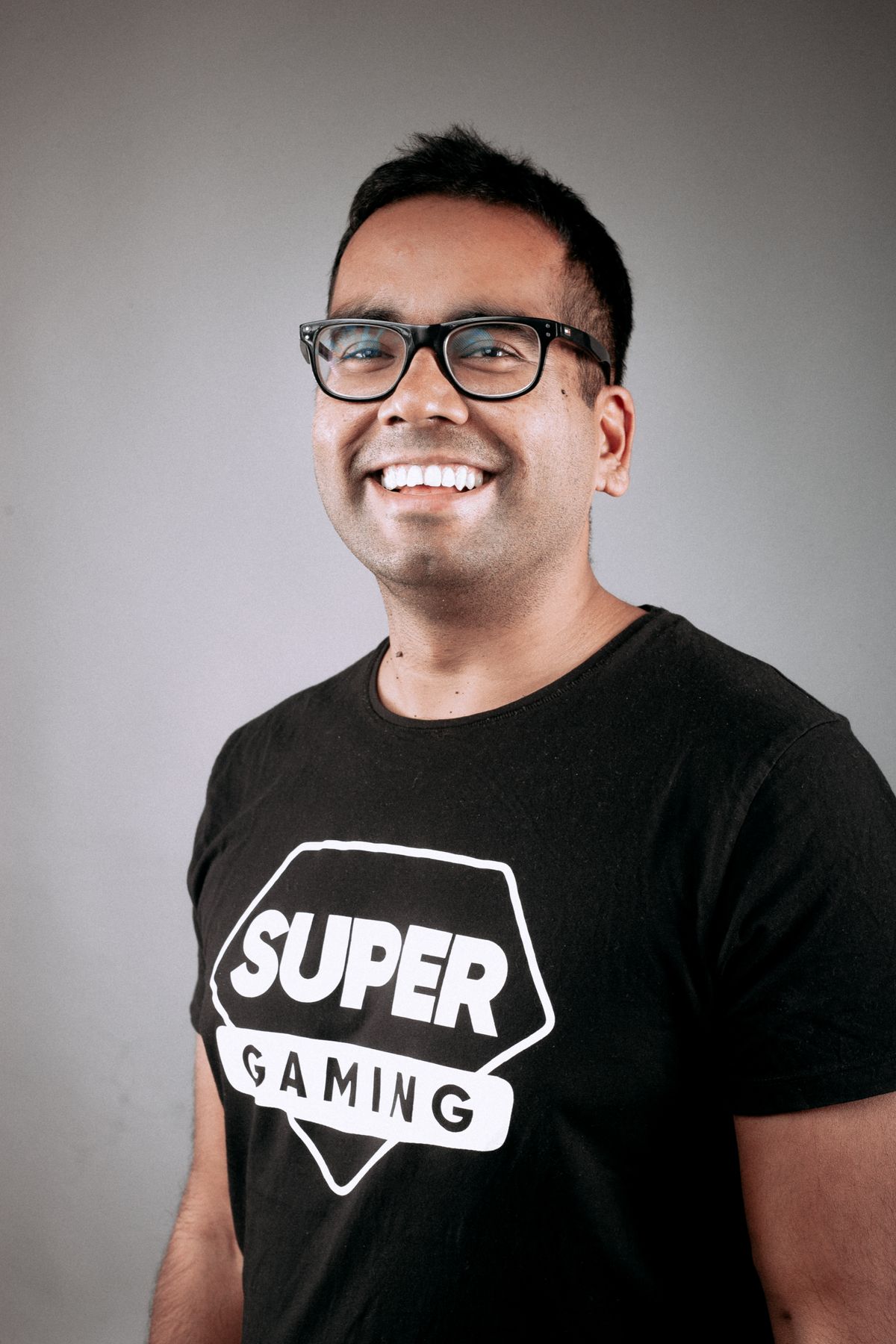Pune, India
Five million gamers are waiting with bated breath for the release of Indus — the most ambitious mobile game ever to come out of India. An "Indo-Futuristic Battle-Royale," Indus caused a stir when its trailer premiered in Times Square, New York City. It then took over billboards in London before making its homecoming to the country's largest multiplex operator, PVR.
In a studio in Pune, 150 km southeast of Mumbai, SuperGaming's 150-strong team is putting the finishing touches on the game, backed up by an outpost at the official HQ in Singapore.
"Indus is like our Black Panther," co-founder Sanket Nadhani enthuses. "We're essentially building India's Wakanda.
"India has this incredibly rich culture that's often overlooked or underrepresented. But what if we show the world? What if we take inspiration from that culture and history, and what if it advanced, like, 500 years into the future? What if we build that world and have a Battle Royale in it?" His excitement for Indus — its potential to showcase Indian culture and his team's game development prowess — is palpable.
An outsider in gaming
Since it was founded in 2019 by Nadhani, Roby John, Sreejit Jayanthan, Christelle D'cruz, and Navneet Waraich, SuperGaming has proliferated. Successful releases thus far include MaskGun (downloaded more than 65 million times worldwide) and Battle Stars, a shooter starring popular YouTuber "Techno Gamerz." The company's headcount has tripled in less than four years, raised $5.5 million in a 2021 Series A round, and struck milestone partnerships with Google Cloud and YouTube. As well as a slew of hit games, the startup has also built the Super Platform, a backend engine for hyper-scaling popular games like PacMan.
One reason behind this growth surge is the staggering expansion of the Indian gaming market at large. The country is home to approximately 450 million gamers, mostly mobile-based rather than PC or console. Between 2017 and 2022, the market grew at a CAGR of nearly 40%. By 2025, it's expected to be worth over $5 billion.
Another critical factor in SuperGaming's upswing was the addition of Sanket Nadhani himself. He doesn't come from a gaming background like his fellow co-founders, who had previously built the indie studio June Gaming (and made it the second-ever Indian company to enter Y Combinator).
For most of his career, Nadhani has operated in marketing, product, and growth roles in the mega-successful Indian SaaS industry. Before SuperGaming, he served as Director of Products at software company Wingify. "I've been in tech startups all my [working] life. So I know how software companies are built and scaled up."
His remit at SuperGaming is to take all his experience overseeing product development and growing an audience as the company gears up for its biggest launch ever. In short, it's to take the abundance of creative talent at SuperGaming's disposal and turn it into a successful business.

Figuring out what sticks
Oddly enough, SuperGaming's emergence as a major gaming studio wasn't part of the plan when the company first launched. It's taken some trial and error to get here.
"When we started, we wanted to build a social destination for gaming," Nadhani explains. "What that means is one single place with simple casual games, social games, party games — all as a way for friends to come together and hang out and banter. These kinds of games only existed as separate apps, at least for social and party games."
The SuperGaming team, then known as "SuperParty," spent two years creating games and developing the community simultaneously. The results were mixed, reflects Nadhani. "Some of our games did pretty well, but the entire SuperParty app… that by itself didn't work."
This is one of the most significant early challenges for any startup — simply establishing what you want to do and if it can be done, or as Nadhani puts it, "figuring out the product that the audience sticks to." SuperParty's performance clearly showed what the audience was sticking to, so the team returned to its strength from June Gaming — building games — and SuperGaming was born. "We merged the two companies [June and SuperParty], and now we're a gaming studio again."
Putting India on the global gaming map
Though it's returned to its roots as a game studio, SuperGaming was founded with a loftier mission: "To build the Indian gaming revolution and put India on the global gaming map."
Sanket justifies the mission in simple terms — it's a numbers game. "India has about 450 million gamers, but a lot of the top games here are from developers outside the country. And forget about India's games being in the top global charts… So we want to change that, right? There should be more games with Indian representation and more Indian games leaving a mark on the global landscape."
MaskGun and BattleStars have made some progress in this regard, but the eagerly awaited Indus is leading the charge. BBC News calls it 'An Unapologetically Indian Universe.' MoneyControl has claimed the game is 'India's Fortnite.' The level of excitement is part validation and part motivation for the SuperGaming team. "We felt that it was something that people would connect with and get behind, and while we have been building this game for about two and a half years, we can see that they just cannot wait for this to launch."
"It's incredible to see the amount of pride and ownership the community is taking in this. It's something we're very excited about building — it's a mission we're able to get up for and get behind every day."
Communities over customers
There's a certain irony in that SuperGaming (then SuperParty) failed to build a gaming community destination as it set out to do. Since focusing on creating individual games, one of the company's major strengths is a loyal and eager community.
"Any gaming company that has been successful will tell you that community is super powerful." But Nadhani also points out that there's no one-size-fits-all approach to community building.
One tactic that works for SuperGaming is crossing the virtual divide, bringing people together in the physical world. "For Indus, we actually hold physical community events, where we invite people to play and meet our team. It's not like a session on Discord or something like that. We try to create this special experience for them so that they can come in, meet the team, and shake hands with everyone who's building the game. So these are incredible experiences for them. We feel that events like these really solidify things."
For already well-established games, it's essential not to rest on one's laurels but to keep rewarding the community for playing. "For Battle Stars, we had these seasonal leaderboards. We'd made the YouTuber Techno Gamerz (with around 35 million subscribers) a playable character… So when Season One ended, the top 100 people in the leaderboard were invited to a special event in Mumbai where they got to meet him."
Nadhani acknowledges the hype that these events generate among the community: "We're talking 12-year old, 15-year old kids, who probably haven't traveled to another city ever, convincing their parents to let them go to these events — even bringing them along — to meet their heroes, to play the game with them, get a photo with them."
One of the critical payoffs in building such a tight community is that the distance between game-maker and gamer is shortened. This creates opportunities to listen to the audience, connect, and reflect. Nadhani recalls the story of Sagar, the Season One leaderboard winner of the game Silly Royale, whose life served as a poignant reminder of why the team does what it does. "Sagar lived in this small rural town, and some of our team went out to him to personally deliver his prize. But when we met him, we realized that he had terminal leukemia and couldn't even step outside his house. He played our game all the time, and the entire family would come together around him and play. It gave him something to look forward to."
"Just one story like that could help us believe that what we do, we can just do it for just one person like Sagar — not for [an abstract] five million people. You really feel that if players are willing to make us such a big part of their lives, then what we're doing is worthwhile."

Letting the team take the lead
For startup leaders, mitigating speed wobbles amidst a rapid scale-up is always challenging. Factor in investor pressure, and in SuperGaming's case, a community baying to get a go at Indus, and instability can set in. "Back when we started, our team was only about 20 people. But when we merged with June Gaming, we immediately grew to 60 or 70, and now we're over 140. It was pretty steady, but in 2022, we went into hyper-speed."
Nadhani recognizes the need to balance startup culture and "corporateness." Interestingly, his way of addressing it is to leave things and people as they are. "I have to be honest. If a management consultant or, you know, someone from a very well-managed large company came to us, they'd be like, 'Guys, you're super unstructured,'" Nadhani laughs.
"And we are! But what keeps us going is that we have a very fun, very passionate team. Games are hard to build, but we have these people who can sort of take care of themselves. We know that our people have plenty of passion and we know they enjoy working with each other. This takes care of so many things that might need specific rules or policies or structures in other places. The engine still keeps on running, and we can still deliver products, right?"
SuperGaming's work on multiple products and spinning many plates helps in this regard, according to Nadhani. "Every game or product is a team in itself, so it's not like we have one team of 100 people. Even Indus has around 60 people, so it's pretty big, but not huge."
The most significant ingredient that binds things together is that, for the most part, the SuperGaming team works in an office. "When you're building games, you're sitting close together a lot of the time and can peek over someone's shoulder when working on something. So you can get feedback right away rather than waiting 30 minutes. It's so much easier to collaborate. It's one of those things where the world is saying 'Go remote' but in-office is working for us. And again, I'm at risk of sounding like a broken record, but if it's a fun team [with] good energy, you can do without a lot of structure."
No time like the present
While the team at SuperGaming is focusing mainly on the release of Indus "To make a game that India is really proud of and is really popular across the world," Nadhani hopes that its success will ignite the country's gaming revolution. "Hopefully we can inspire the entire Indian gaming community — players and studios. And maybe five years from now, there'll be 100 successful gaming companies from here."
It might be possible for one company to put India on the global gaming map, but it will take more than that to stay there. As far as Nadhani is concerned, the country is on the verge of a watershed moment, which excites him. "There is not going to be a better time than now. It's just at this inflection point, where as soon as there are a couple of successes, there will be tens and hundreds of them."
He's noticed an encouraging shift in the style of game being made and played in the country, too, which bodes well. "Most companies were building things like card games, but in the last few years, studios have started attempting much more ambitious games. It's great to see. And with people open to playing deeper, more immersive games and their willingness to pay, you can make good revenue.
"If you want to build deeper games and bring richer experiences to people, the audience is ready for it. If you've ever dreamed of building a gaming company in India, and you have the skills or at least some of the skills, now's the time to go for it."





